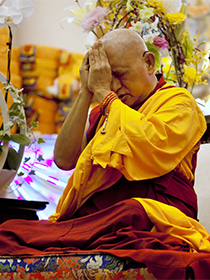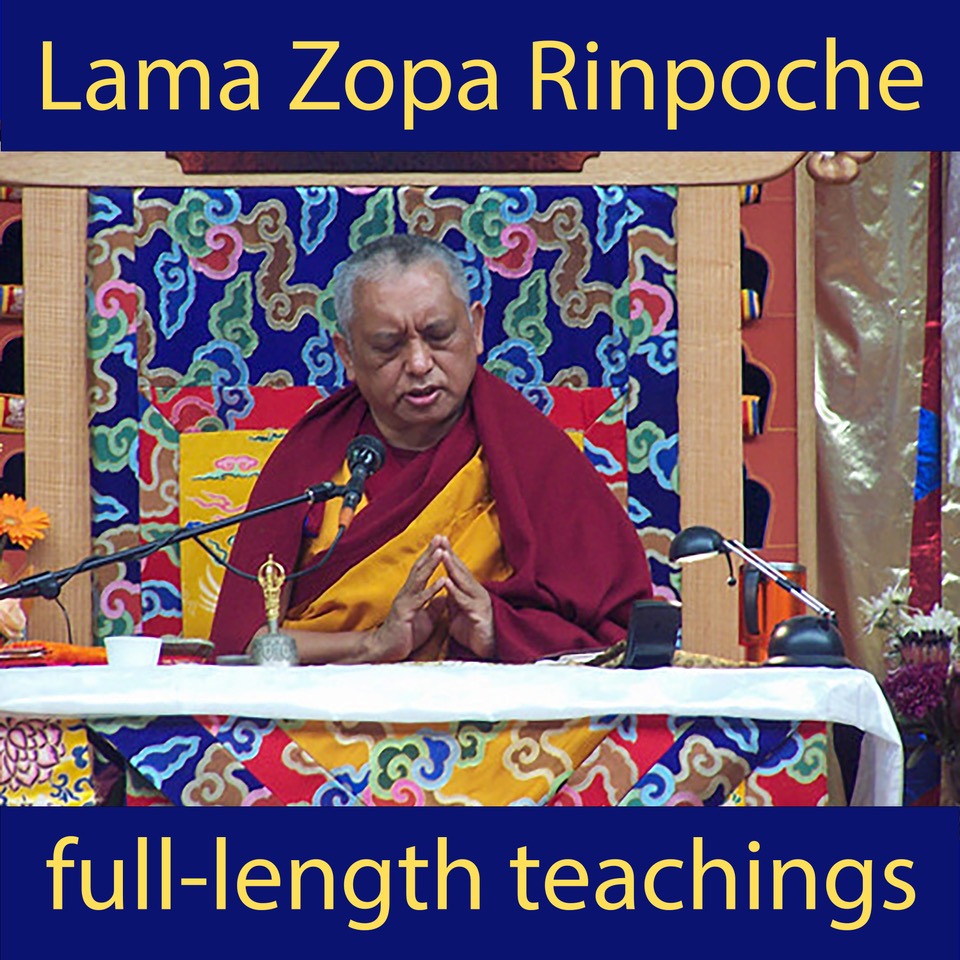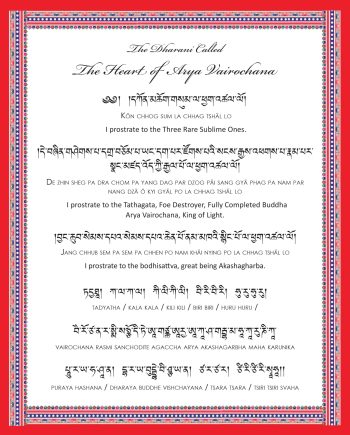- Home
- FPMT Homepage
Foundation for the Preservation of the Mahayana Tradition
The FPMT is an organization devoted to preserving and spreading Mahayana Buddhism worldwide by creating opportunities to listen, reflect, meditate, practice and actualize the unmistaken teachings of the Buddha and based on that experience spreading the Dharma to sentient beings. We provide integrated education through which people’s minds and hearts can be transformed into their highest potential for the benefit of others, inspired by an attitude of universal responsibility and service. We are committed to creating harmonious environments and helping all beings develop their full potential of infinite wisdom and compassion. Our organization is based on the Buddhist tradition of Lama Tsongkhapa of Tibet as taught to us by our founders Lama Thubten Yeshe and Lama Thubten Zopa Rinpoche.
- Willkommen
Die Stiftung zur Erhaltung der Mahayana Tradition (FPMT) ist eine Organisation, die sich weltweit für die Erhaltung und Verbreitung des Mahayana-Buddhismus einsetzt, indem sie Möglichkeiten schafft, den makellosen Lehren des Buddha zuzuhören, über sie zur reflektieren und zu meditieren und auf der Grundlage dieser Erfahrung das Dharma unter den Lebewesen zu verbreiten.
Wir bieten integrierte Schulungswege an, durch denen der Geist und das Herz der Menschen in ihr höchstes Potential verwandelt werden zum Wohl der anderen – inspiriert durch eine Haltung der universellen Verantwortung und dem Wunsch zu dienen. Wir haben uns verpflichtet, harmonische Umgebungen zu schaffen und allen Wesen zu helfen, ihr volles Potenzial unendlicher Weisheit und grenzenlosen Mitgefühls zu verwirklichen.
Unsere Organisation basiert auf der buddhistischen Tradition von Lama Tsongkhapa von Tibet, so wie sie uns von unseren Gründern Lama Thubten Yeshe und Lama Thubten Zopa Rinpoche gelehrt wird.
- Bienvenidos
La Fundación para la preservación de la tradición Mahayana (FPMT) es una organización que se dedica a preservar y difundir el budismo Mahayana en todo el mundo, creando oportunidades para escuchar, reflexionar, meditar, practicar y actualizar las enseñanzas inconfundibles de Buda y en base a esa experiencia difundir el Dharma a los seres.
Proporcionamos una educación integrada a través de la cual las mentes y los corazones de las personas se pueden transformar en su mayor potencial para el beneficio de los demás, inspirados por una actitud de responsabilidad y servicio universales. Estamos comprometidos a crear ambientes armoniosos y ayudar a todos los seres a desarrollar todo su potencial de infinita sabiduría y compasión.
Nuestra organización se basa en la tradición budista de Lama Tsongkhapa del Tíbet como nos lo enseñaron nuestros fundadores Lama Thubten Yeshe y Lama Zopa Rinpoche.
A continuación puede ver una lista de los centros y sus páginas web en su lengua preferida.
- Bienvenue
L’organisation de la FPMT a pour vocation la préservation et la diffusion du bouddhisme du mahayana dans le monde entier. Elle offre l’opportunité d’écouter, de réfléchir, de méditer, de pratiquer et de réaliser les enseignements excellents du Bouddha, pour ensuite transmettre le Dharma à tous les êtres. Nous proposons une formation intégrée grâce à laquelle le cœur et l’esprit de chacun peuvent accomplir leur potentiel le plus élevé pour le bien d’autrui, inspirés par le sens du service et une responsabilité universelle. Nous nous engageons à créer un environnement harmonieux et à aider tous les êtres à épanouir leur potentiel illimité de compassion et de sagesse. Notre organisation s’appuie sur la tradition guéloukpa de Lama Tsongkhapa du Tibet, telle qu’elle a été enseignée par nos fondateurs Lama Thoubtèn Yéshé et Lama Zopa Rinpoché.
Visitez le site de notre Editions Mahayana pour les traductions, conseils et nouvelles du Bureau international en français.
Voici une liste de centres et de leurs sites dans votre langue préférée
- Benvenuto
L’FPMT è un organizzazione il cui scopo è preservare e diffondere il Buddhismo Mahayana nel mondo, creando occasioni di ascolto, riflessione, meditazione e pratica dei perfetti insegnamenti del Buddha, al fine di attualizzare e diffondere il Dharma fra tutti gli esseri senzienti.
Offriamo un’educazione integrata, che può trasformare la mente e i cuori delle persone nel loro massimo potenziale, per il beneficio di tutti gli esseri, ispirati da un’attitudine di responsabilità universale e di servizio.
Il nostro obiettivo è quello di creare contesti armoniosi e aiutare tutti gli esseri a sviluppare in modo completo le proprie potenzialità di infinita saggezza e compassione.
La nostra organizzazione si basa sulla tradizione buddhista di Lama Tsongkhapa del Tibet, così come ci è stata insegnata dai nostri fondatori Lama Thubten Yeshe e Lama Zopa Rinpoche.
Di seguito potete trovare un elenco dei centri e dei loro siti nella lingua da voi prescelta.
- 欢迎 / 歡迎
简体中文
“护持大乘法脉基金会”( 英文简称:FPMT。全名:Foundation for the Preservation of the Mahayana Tradition) 是一个致力于护持和弘扬大乘佛法的国际佛教组织。我们提供听闻,思维,禅修,修行和实证佛陀无误教法的机会,以便让一切众生都能够享受佛法的指引和滋润。
我们全力创造和谐融洽的环境, 为人们提供解行并重的完整佛法教育,以便启发内在的环宇悲心及责任心,并开发内心所蕴藏的巨大潜能 — 无限的智慧与悲心 — 以便利益和服务一切有情。
FPMT的创办人是图腾耶喜喇嘛和喇嘛梭巴仁波切。我们所修习的是由两位上师所教导的,西藏喀巴大师的佛法传承。
繁體中文
護持大乘法脈基金會”( 英文簡稱:FPMT。全名:Found
ation for the Preservation of the Mahayana Tradition ) 是一個致力於護持和弘揚大乘佛法的國際佛教組織。我們提供聽聞, 思維,禪修,修行和實證佛陀無誤教法的機會,以便讓一切眾生都能 夠享受佛法的指引和滋潤。 我們全力創造和諧融洽的環境,
為人們提供解行並重的完整佛法教育,以便啟發內在的環宇悲心及責 任心,並開發內心所蘊藏的巨大潛能 — 無限的智慧與悲心 – – 以便利益和服務一切有情。 FPMT的創辦人是圖騰耶喜喇嘛和喇嘛梭巴仁波切。
我們所修習的是由兩位上師所教導的,西藏喀巴大師的佛法傳承。 察看道场信息:
- FPMT Homepage
- News/Media
-
- Study & Practice
-
-
- About FPMT Education Services
- Latest News
- Programs
- New to Buddhism?
- Buddhist Mind Science: Activating Your Potential
- Heart Advice for Death and Dying
- Discovering Buddhism
- Living in the Path
- Exploring Buddhism
- FPMT Basic Program
- FPMT Masters Program
- FPMT In-Depth Meditation Training
- Maitripa College
- Lotsawa Rinchen Zangpo Translator Program
- Universal Education for Compassion & Wisdom
- Online Learning Center
-
- Prayers & Practice Materials
- Overview of Prayers & Practices
- Full Catalogue of Prayers & Practice Materials
- Explore Popular Topics
- Benefiting Animals
- Chenrezig Resources
- Death & Dying Resources
- Lama Chopa (Guru Puja)
- Lama Zopa Rinpoche: Compendium of Precious Instructions
- Lama Zopa Rinpoche: Life Practice Advice
- Lama Zopa Rinpoche Practice Series
- Lamrim Resources
- Mantras
- Prayer Book Updates
- Purification Practices
- Sutras
- Thought Transformation (Lojong)
- Audio Materials
- Dharma Dates - Tibetan Calendar
- Translation Services
- Publishing Services
- Ways to Offer Support
- Prayers & Practice Materials
-
- Teachings and Advice
- Find Teachings and Advice
- Lama Zopa Rinpoche Advice Page
- Lama Zopa Rinpoche: Compendium of Precious Instructions
- Lama Zopa Rinpoche Video Teachings
- ༧སྐྱབས་རྗེ་བཟོད་པ་རིན་པོ་ཆེ་མཆོག་ནས་སྩལ་བའི་བཀའ་སློབ་བརྙན་འཕྲིན།
- Podcasts
- Lama Yeshe Wisdom Archive
- Buddhism FAQ
- Dharma for Young People
- Resources on Holy Objects
- Teachings and Advice
-
-
*If a menu item has a submenu clicking once will expand the menu clicking twice will open the page.
-
-
- Centers
-
- Teachers
-
- Projects
-
-
-
-
*If a menu item has a submenu clicking once will expand the menu clicking twice will open the page.
-
-
- FPMT
-
-
-
-
-
If you follow self-cherishing thoughts, those thoughts become your identity. Then anger, pride, the jealous mind – all this negative emotional stuff arises. When you let go of the I and cherish others, negative emotional thoughts do not arise. That’s very clear. Anger does not arise at those you cherish.
Lama Zopa Rinpoche
-
-
-
- Shop
-
-
-
The Foundation Store is FPMT’s online shop and features a vast selection of Buddhist study and practice materials written or recommended by our lineage gurus. These items include homestudy programs, prayers and practices in PDF or eBook format, materials for children, and other resources to support practitioners.
Items displayed in the shop are made available for Dharma practice and educational purposes, and never for the purpose of profiting from their sale. Please read FPMT Foundation Store Policy Regarding Dharma Items for more information.
-
-
Advice from Lama Zopa Rinpoche
23
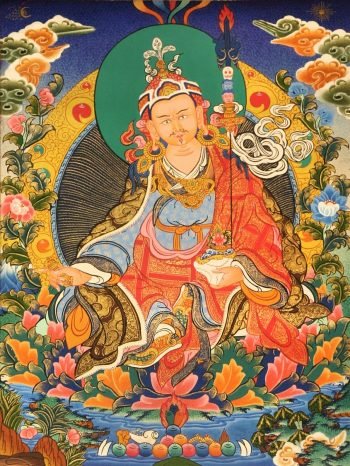
Padmasambhava (also known as Guru Rinpoche)
In 2022, after the war in Ukraine started, Lama Zopa Rinpoche offered advice on prayers and practices to do in order to pacify the threats of war. All are welcome to download the booklet, Prayers to Stop War.
At the time, Lama Zopa Rinpoche also gave advice for how to motivate and think when doing these prayers and practices:
At the beginning generate strong bodhicitta, then do these prayers and practices to stop the war. The main purpose is to stop the war immediately. Then also to prevent famine, disease, and all the dangers of earth, water, fire, and wind, for all these dangers to be pacified immediately. To fill the whole world with perfect peace and happiness, including enlightenment, and to generate loving kindness, compassion and bodhicitta in the heart of all sentient beings.
Think that from Guru Padmasambhava’s heart, beams radiate and totally purify all the six realms’ sentient beings, totally purify all the delusions and negative karmas collected from beginningless rebirths, especially anger, attachment, and ignorance; think that these are totally purified. Then recite Sampa Lhundrupma, followed by the Padmasambhava mantra (one or two malas).
With strong faith in Guru Padmasambhava and total reliance, Guru Padmasambhava will definitely help because his compassion embraces all sentient beings.
Then another way to think is, with strong faith in His Holiness the Dalai Lama in the aspect of Guru Padmasambhava, nectar beams are emitted to all leaders of war, entering the body and totally purifying all negative karma and obscurations; all the dissatisfied mind, desire, ignorance, anger, and selfish mind are totally purified; they generate bodhicitta especially, and then the whole path to enlightenment. Do that very strongly, making strong prayers to His Holiness the Dalai Lama.
Then nectar beams are also emitted to all involved, and these purify all the anger and self-cherishing thought. They generate bodhicitta, and stop giving harm to even one sentient being and only benefit sentient beings, up to enlightenment.
Then recite the Heart Sutra and the prayer to stop wars.
For those who can do the Most Secret Hayagriva sadhana, do this at the beginning of the practice. When reciting the mantra, you can do the same visualizations as above.
Lama Zopa Rinpoche gave this advice in 2022 to IMI Sangha on prayers and practices they could do in response to the developing war in Ukraine. The above motivation was edited slightly to be more general in order to be relevant for current threats at any time. The original advice can be read here. Please download Prayers to Stop War .
Foundation for the Preservation of Mahayana Tradition (FPMT), is a Tibetan Buddhist organization dedicated to the transmission of the Mahayana Buddhist tradition and values worldwide through teaching, meditation and community service.
2
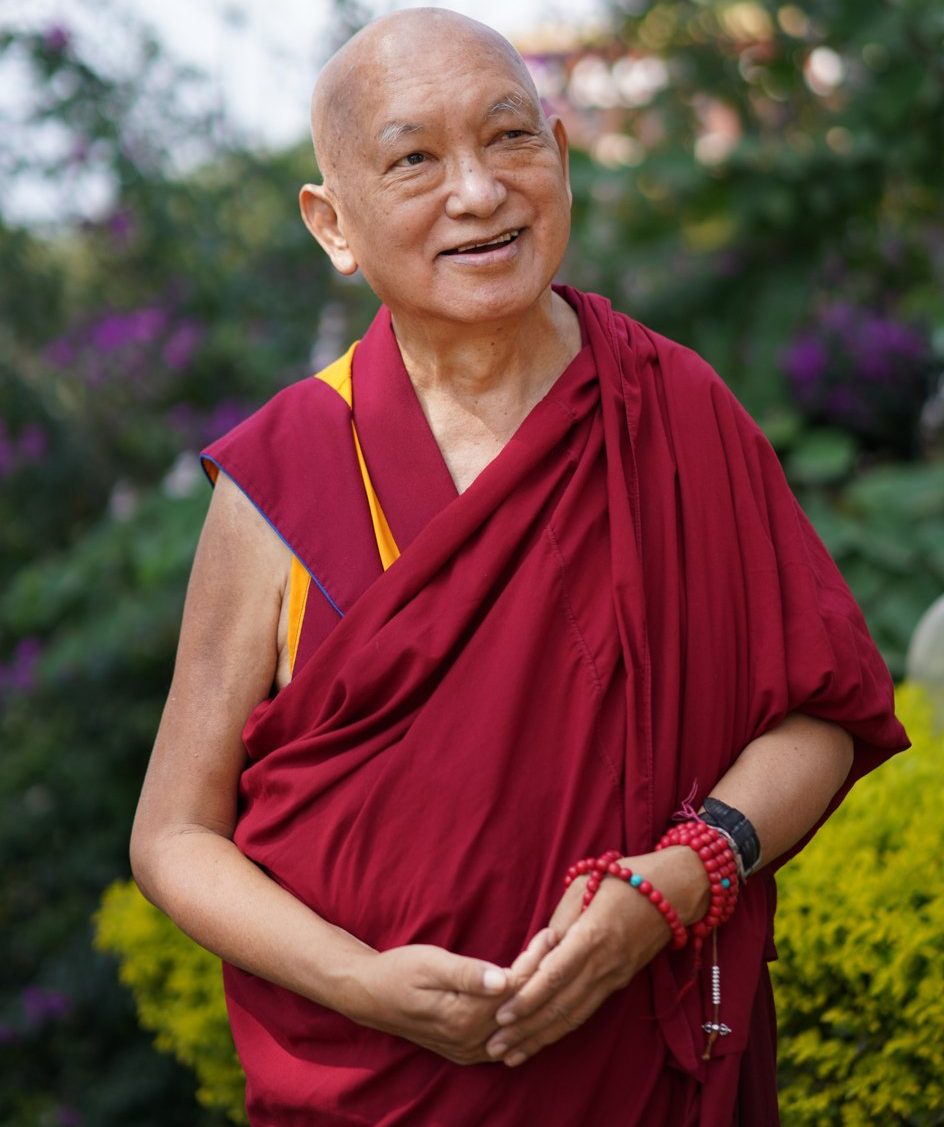
Lama Zopa Rinpoche in the garden at Kopan Monastery, Nepal, October 2020. Photo by Ven. Lobsang Sherab.
Last month we shared our 2024 Annual Review: What a Difference We All Have Made Together. Every year we include poignant advice from lama Zopa Rinpoche as the opening to our yearly report. This year, as we work together on the future of the FPMT organization, we felt it fitting to share some sections of advice Rinpoche once offered a new FPMT center director. His words are meaningful to all of us serving in various positions with the FPMT organization, and offer a path of success, starting with— of course, kindness.
An Unbelievable Opportunity
A letter to a new center director from Lama Zopa Rinpoche
The purpose of an FPMT center is to take care of the minds of others, to keep the mind in virtue as much as possible. This means keeping your own mind in virtue. YOU HAVE TO TRY. IT IS VERY GOOD TO TRY. If you can’t do that, you can’t help others. So your motivation should be to use your body, speech and mind to create even the smallest happiness in others. Many people in the world waste their lives. People try to climb mountains no matter what risk to their life, some people use themselves as bullets, getting fired from cannons, and so forth, unbelievable things, putting their lives in danger to achieve such insignificant happiness in this life. …
When you train the mind in positive virtue, especially a good heart trying to benefit others, it creates very good communication. There is no Great Wall between yourself and others. It brings so much happiness to you and others, and brings world peace. …
Every sentient being has buddha nature. Even a mosquito can achieve enlightenment and liberation from the oceans of samsaric suffering if it practices Dharma. So especially for us who now have this precious human body, which can do so many things to liberate from any problem or circumstance that gives rise to problems, especially having a perfect human rebirth on top of buddha nature, we are able to achieve all the happiness for all future lives, even for insects, ants, cockroaches, spiders and snakes, even for a mouse. …
Being the director of a center means you have an unbelievable, unbelievable, unbelievable opportunity to help yourself and others, to purify unbelievable negative karma that has been created since beginningless lifetimes, especially if this is the Guru’s advice or what you are doing makes the Guru very happy; then every second of that action as a director has incredible purification—the most powerful purification – especially if the work is more difficult and hard to bear. When there are more problems and difficulties, you should recognize all the most unbelievable, unbelievable, unbelievable benefit you receive: more powerful purification and collecting extensive merits to rapidly attain enlightenment. For example, Milarepa achieved enlightenment in the quickest time. Because of his enlightened Guru, Marpa’s most wise skills, he purified in the quickest way all the negative karma collected from beginningless rebirths, of killing humans and animals; then collected extensive merit that would take three countless great eons in the Sutra Paramita path, enabling Milarepa to become enlightened in a brief lifetime of degenerative time.
Now you should realize that Director means that you are going to be the principal person to receive blame, criticism and various things that cause the negative emotions to rise. It makes them very active, even violent sometimes, and it is possible even friends might become enemies because of having different views and the discipline you have to make. You can avert such things if you don’t want them by various practices, starting with kindness. Maybe here the motivation could be selfish, doing the practice so you can be happy, not thinking about others; doing this practice so others can be happy is not selfish.
Especially towards those who are angry or disrespectful, criticizing the director, practice compassion and loving kindness. Also practice patience, and rejoicing always in virtuous and meaningful things, those that result in good karma, which happened and are happening to yourself and other people.
It is important to be clear about right and wrong patience and contentment. Bearing whatever hardships necessary in order to harm holy beings, other sentient beings, your enemy etc., also bearing much hardship for negative karma, is wrong patience.
There are three types of patience:
- Patience of voluntarily taking on suffering or difficulties
- Patience towards an enemy who is harming you or you don’t like
- Patience of definitely thinking of Dharma, e.g. studying philosophy no matter how hard it is to understand; maintaining practice for realizations no matter how long it takes or difficult it is. …
Virtuous actions and virtuous thoughts need to be developed until enlightenment is achieved. Always continuously develop completing the great works, as much as one can, like collecting merit, the cause of happiness, developing realizations, to achieve liberation and enlightenment. One should never be content regarding developing positive actions, virtue, which lead to one’s own and others’ ultimate happiness, enlightenment; always strive to do more.
Apologize immediately if one did some mistake, harmed others, was disrespectful or said hurtful words. Forgive immediately if somebody gets angry, is disrespectful to you or harms you. Develop courage by thinking of the benefit to others, serving others. This is the best offering to the buddhas and bodhisattvas. Not courage in collecting negative karma, harming oneself and others, but develop courage in virtue, good qualities, that which is Dharma. Otherwise sometimes people have funny definitions of good qualities, what you should be or do—HA HA HA!
Yes, of course thinking of benefiting others, serving others from the heart —WOW! Can you imagine? Like a mother cherishes her most beloved child, wishing happiness, especially ultimate happiness of enlightenment, as mentioned in Guru Puja, Lama Chopa.
If these things are done, trying to practice is the best offering, fulfilling all the buddhas’ and bodhisattvas’ holy wishes – WOW!
So please enjoy numberless billions trillions and zillions.
Excerpted from Lama Zopa Rinpoche’s letter to a new FPMT center director, 2009.
If you haven’t yet taken at a look at our 2024 Annual Review, we invite you to view it online.
Foundation for the Preservation of Mahayana Tradition (FPMT), is a Tibetan Buddhist organization dedicated to the transmission of the Mahayana Buddhist tradition and values worldwide through teaching, meditation and community service.
- Tagged: advice from lama zopa rinpoche
7
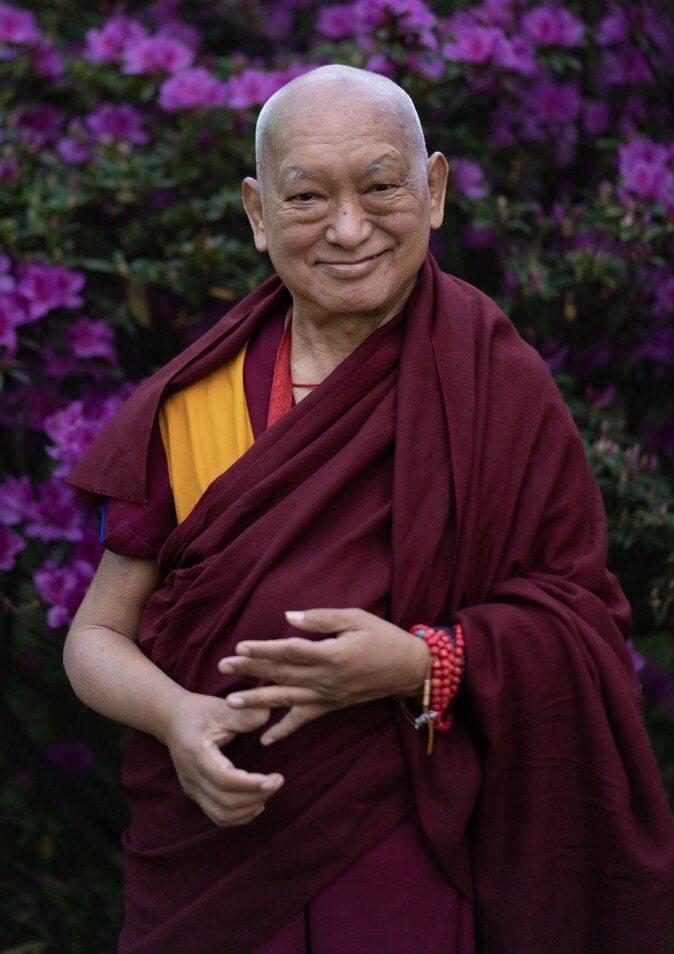
Lama Zopa Rinpoche in Nepal, March 27, 2023. Photo by Ven. Lobsang Sherab.
With great rejoicing we share the wonderful news just announced at the 2025 CPMT Summit that His Holiness the Dalai Lama has confirmed that the reincarnation of our most precious spiritual director, Kyabje Lama Zopa Rinpoche, has been reborn. According to His Holiness’s observation, the reincarnation has taken rebirth in Nepal. A translation of His Holiness’s message from March 18, 2025 reads:
An Answer to the Request for Checking on the Reincarnation of Zopa Rinpoche
As requested mainly by devotees of Kopan Ogmin Jangchub Choling Monastery, Kopan Khachoe Gakhyil Ling Nunnery, FPMT centers worldwide, together with Sera Je Drati Khangtsen and the disciples in general. The result of checking is:
The reincarnation of Zopa Rinpoche shows to exist and that too appears to show inside Nepal, gradually look for and do the investigation.
For pujas and prayers carry on the recitation of Chanting the Names of Manjushri (Jampal Tsenjo) and Migtsema.
The FPMT Inc. Board of Directors has appointed a search team: Khenrinpoche Geshe Chonyi, Ven. Roger Kunsang, Ven. Thubten Pemba, Ani Tenzin Jangsem, Ven. Tenpa Choden, and Dale Davis.
All are encouraged to continue reciting Chanting the Names of Noble Manjushri as well as Migtsema practice as advised by His Holiness.
We will share updates and news on this process as it unfolds. Please join us in rejoicing in this wonderful news.
Lama Zopa Rinpoche (1945-2023) was the spiritual director of the Foundation for the Preservation of Mahayana Tradition (FPMT), a Tibetan Buddhist organization dedicated to the transmission of the Mahayana Buddhist tradition and values worldwide through teaching, meditation and community service.
7
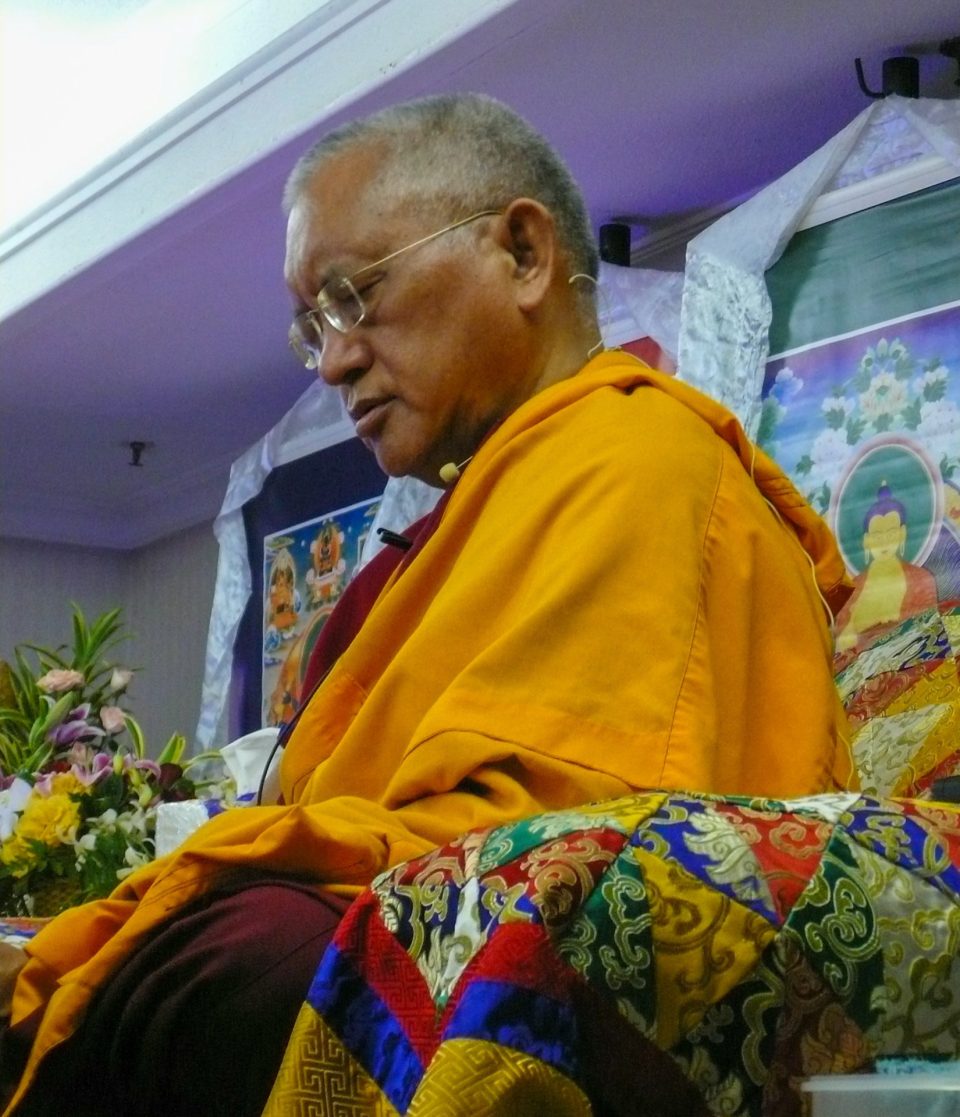
Lama Zopa Rinpoche teaching at Potowa Center, Indonesia, 2010. Photo by Ven. Thubten Kunsang.
From January 25 through February 7, 2010, Lama Zopa Rinpoche offered 12 sessions of teachings at Potowa Center in Indonesia. These teachings provided a comprehensive overview of key Buddhist concepts, focusing on how to integrate them into daily practice to progress on the path to enlightenment. All 12 videos from this event are available on our RAN page.
Today we share a teaching from this series, a concise 12 minute video, “Dedicating Oneself to Benefit Others” which begins with a very interesting conversation with a student about who “owns” one’s body and mind:
All of these sessions are available for students to explore as they wish. On this page, you can also find a full combined transcript of these teachings, more information about the sessions, and MP3 audio download.
As students of Lama Zopa Rinpoche, we are unbelievably blessed by the vastness of beneficial teachings left for us over decades, and in a wide variety of formats. Please explore our Rinpoche Available Now page, the Essential Extracts page, the FPMT YouTube channel, enjoy teachings in podcast format, and also peruse the Lama Yeshe Wisdom Archive for essential advice and teachings from Lama Zopa Rinpoche.
Foundation for the Preservation of Mahayana Tradition (FPMT), is a Tibetan Buddhist organization dedicated to the transmission of the Mahayana Buddhist tradition and values worldwide through teaching, meditation and community service.
18
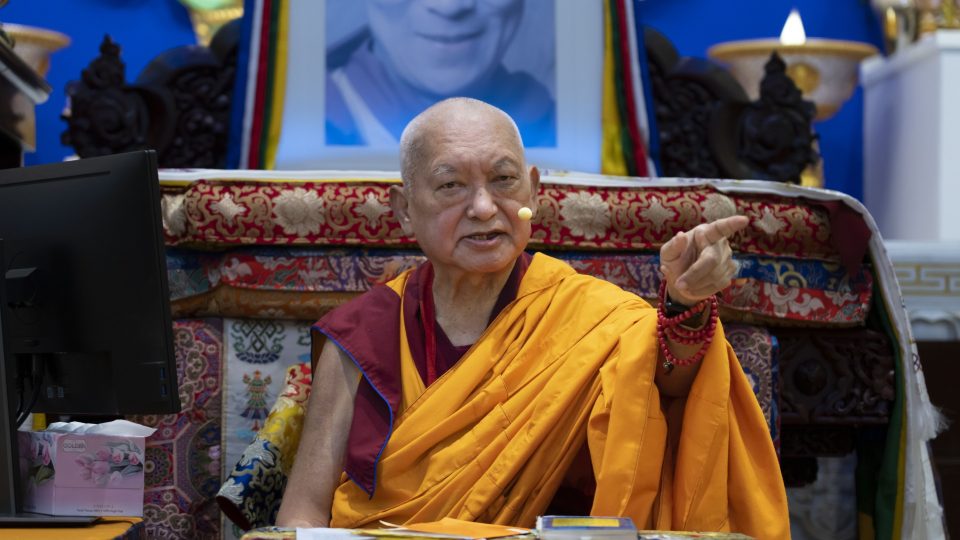
Lama Zopa Rinpoche teaching at Amitabha Buddhist Centre, Singapore, August 2022. Photo by Ven. Lobsang Sherab.
Lama Zopa Rinpoche offered many teachings from Amitabha Buddhist Centre in Singapore from July-September 2022. On August 10 of that year, he gave a recorded teaching about how anger destroys happiness.
In this video, Rinpoche reminds that we can train our mind to practice patience, and it gets easier the more we practice. Since anger is the cause of hell suffering, we should stop it. Therefore, motivate every morning to practice patience. Otherwise, anger suddenly arises. You have to prepare yourself with determination to stop it.
Please watch Rinpoche giving this teaching on video, and access a full transcript.
As students of Lama Zopa Rinpoche, we are unbelievably blessed by the vastness of beneficial teachings left for us over decades, and in a wide variety of formats. Please explore our Rinpoche Available Now page, the Essential Extracts page, the FPMT YouTube channel, enjoy teachings in podcast format, and also peruse the Lama Yeshe Wisdom Archive for essential advice and teachings from Lama Zopa Rinpoche.
Foundation for the Preservation of Mahayana Tradition (FPMT), is a Tibetan Buddhist organization dedicated to the transmission of the Mahayana Buddhist tradition and values worldwide through teaching, meditation and community service.
- Tagged: advice from lama zopa rinpoche, anger
22
From April 10 to May 10, 2004, Lama Zopa Rinpoche gave extensive teachings during the Mahamudra Retreat. While the retreat focused on Mahamudra, Rinpoche also taught on a wide range of lamrim topics. Video of these teachings is also available on our Rinpoche Available Now page.
New episodes of this series will be released every week, and as there are fifty teachings in this series, one can easily plan for a whole year of teachings by Rinpoche through following this series.
This podcast is currently available through podcast apps, such as Apple Podcasts, Google Podcasts, Spotify, Overcast, and most major podcast apps. Search for the show title “Lama Zopa Rinpoche full-length teachings” to find the show in the podcast app. If you want to know how to listen to podcasts through an app, a search of the internet offers many resources to help you.
(For those wanting to listen in browsers like Chrome or Firefox [not Safari], the RSS feed link is https://feeds.captivate.fm/lama-zopa-rinpoche-full-length/).
Foundation for the Preservation of Mahayana Tradition (FPMT), is a Tibetan Buddhist organization dedicated to the transmission of the Mahayana Buddhist tradition and values worldwide through teaching, meditation and community service.
- Tagged: advice from lama zopa rinpoche, mahamudra, podcast
15
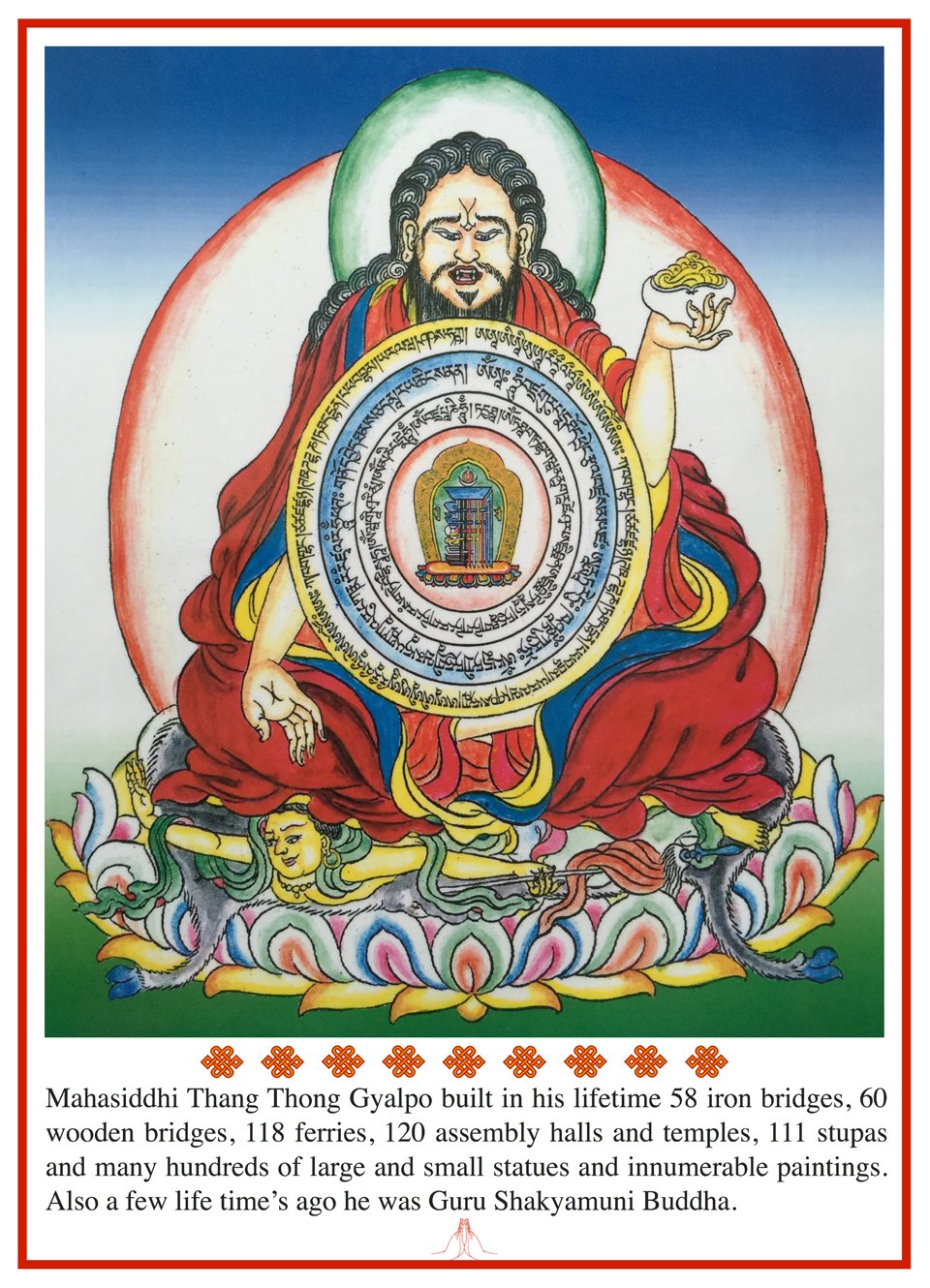
Thang Thong Gyalpo Earthquake Protection
The FPMT organization is devastated to hear the news that a powerful 6.8 earthquake struck on January 7, 2025 in the Dingri region of Tibet, with tremors felt across the Himalayas in neighboring Nepal, Bhutan and parts of northern India.
Many FPMT centers and students are doing prayers for those affected. Rinpoche has offered advice for prayers and protection from earthquakes and recommended Thang Thong Gyalpo protection image for anyone living in areas that are prone to earthquakes.
The main practices to do are:
- Ksitigharba mantra and practice (also sutra)
- Medicine Buddha
- Practices to Control Earthquakes and the Four Elements
- Lama Zopa Rinpoche also gave more extensive advice on how to think and how to benefit those who have died
We also would like to share that Kopan Monastery and Nunnery have been doing pujas for those affected, to show our solidarity and support for those who have nothing. His Holiness the 14th Dalai Lama also led prayers immediately for victims of the earthquake at Tashi Lhunpo Monastery in Bylakuppe, Karnataka.
Foundation for the Preservation of Mahayana Tradition (FPMT), is a Tibetan Buddhist organization dedicated to the transmission of the Mahayana Buddhist tradition and values worldwide through teaching, meditation and community service.
- Tagged: earthquakes
10
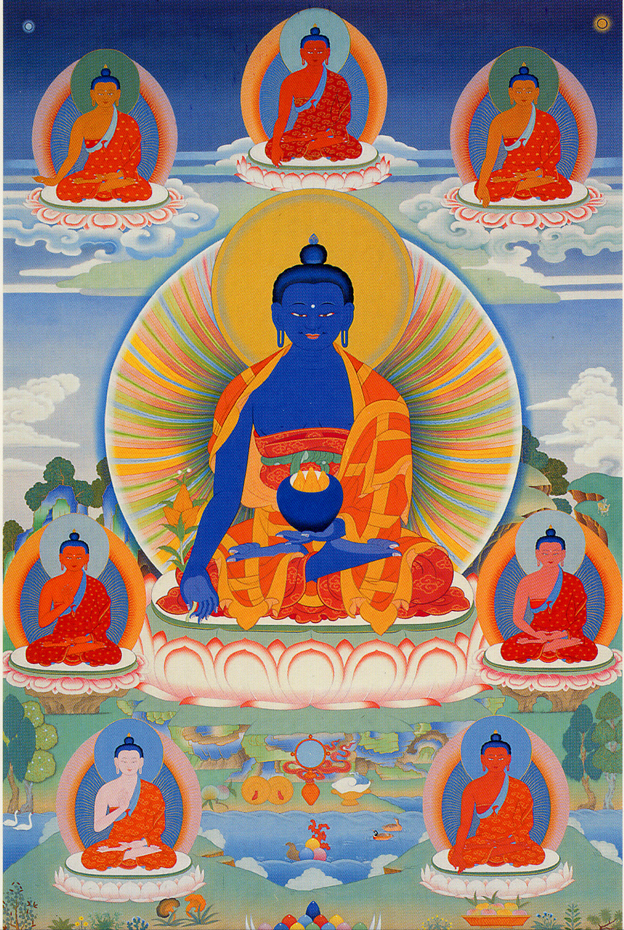
Medicine Buddha by Peter Iseli,
Lama Zopa Rinpoche has offered the following advice for practices one can do in relation to the dangers of fire, for oneself or others:
Medicine Buddha
When there are fires the best thing to do is rely on the Medicine Buddha, to do Medicine Buddha puja (which can be downloaded here).
White Umbrella Practice
There’s an Umbrella protection, prayer and mantra which can be put around your house, inside and outside, to protect from the fire.
You can also put the White Umbrella deity’s picture up. Then you should visualize that rainfalls of nectar are emitted. This nectar stops the fires, purifies the suffering of the insects, and purifies the negative karma of all the sentient beings. All are liberated.
The Heart Mantra of Arya Vairocana
Put the Heart Mantra of Arya Vairocana around the house/buildings to protect from fire danger.
Ksitigarbha Mantra and Practice
Recite the Ksitigarbha mantra and do the practice as much as possible.
Chenrezig Practice
Then also you can do Chenrezig practice. Completely rely on Chenrezig, make prayers and visualize Chenrezig in the sky, and nectar flows from Chenrezig and purifies all the causes of the fire – the main cause is negative karma.
Lama Chopa
Visualize the Lama Chopa merit field with a great stream of nectar coming from the merit field and putting out the fires and especially helping the insects and animas who are suffering and perishing in the fire. This is best done in the context of doing the whole Lama Chopa (if you have time). Showers of nectar pour down purifying the negative karma of the suffering sentient beings who are suffering from the fire and who have been destroyed in the fire, and also of all the suffering sentient beings in the six realms. Also visualize that the nectar as it pours down is changing the karma and the minds of the nagas, dergye (harmful spirits) and landlord beings, changing their negative mind so that they do not harm anymore. It’s very important that one has one-pointed refuge in the merit field while doing this practice, and that one recites the mig-me mantras while doing this visualization.
Protector Prayers
Doing protector prayers is very good, especially tea offering to dergye as they control the elements, so it is important to appease them. But you can’t just offer tea and do nothing with the mind; you have to generate great bliss and emptiness.
Please read more extensive commentary and advice from Lama Zopa Rinpoche on these practices.
Please also read advice Rinpoche offered in 2017 regarding California fires.
Foundation for the Preservation of Mahayana Tradition (FPMT), is a Tibetan Buddhist organization dedicated to the transmission of the Mahayana Buddhist tradition and values worldwide through teaching, meditation and community service.
- Tagged: disasters of the elements, fires, wildfires
6
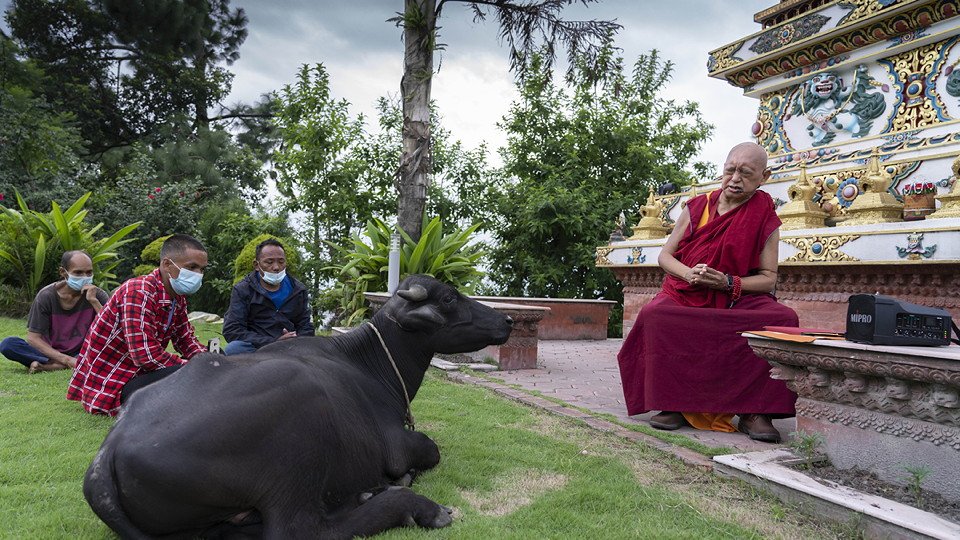
Lama Zopa Rinpoche and a young buffalo that he liberated, Kopan Monastery, Nepal, August 2021. Photo by Ven. Lobsang Sherab.
Last month we shared a report on recent beneficial activities supported by the Animal Liberation Fund. In this report we updated on a buffalo named Bodhichitta, a buffalo blessed by Lama Zopa Rinpoche in 2021. Today we are re-sharing a video of that blessing and Rinpoche personally sharing the story of how he came into contact with this special animal.
Please watch this touching video:
https://youtu.be/9sbZm1Xk_5M
Bodhichitta the buffalo is now thriving at the Animal Liberation Sanctuary at Kopan Monastery in Nepal, enjoying daily life surrounded by care and love.
Please read the full story of this buffalo, in Rinpoche’s words, from 2021.
There are many resources available for those wishing to benefit animals, including advice from Lama Zopa Rinpoche and links to practices and materials:
https://fpmt.org/education/prayers-and-practice-materials/benefiting-animals-practices-and-advice/
All are welcome to contribute to the Animal Liberation Fund to help ensure that our work sponsoring animal rescue, care, and liberation continues.
27

Turkeys at a farm. Photo courtesy of Pixabay.
Every year in the United States, tens of millions of turkeys are killed for the holiday of Thanksgiving, which is this Thursday, November 28, 2024. Lama Zopa Rinpoche offered advice in a 2018 teaching to help benefit the turkeys killed, and how we can think during the holiday. Rinpoche explained that these practices can be applied beyond the Thanksgiving holiday, “These are simple methods, but they have unbelievably profound benefits, like the sky. You can also do more or different practices as well. These are just suggestions. You can also do these practices at Christmas or on other occasions where turkeys and so many other animals are sacrificed and eaten.”
In “Prayers and Practices to Do for Turkeys at Thanksgiving”, Rinpoche explains,
“If you are Buddhist, or just someone who does not want to suffer now or in endless future lives as well, having to experience unbelievably suffering, you need to purify your past negative karma and stop creating any more so that you will not be reborn as a turkey over and over again. … If you do have to eat turkey because of some family obligation, then at least do some mantras and prayers to benefit the turkeys, such as the four immeasurables with tonglen. Otherwise, if you just enjoy eating turkey together with the rest of the Americans who are not Buddhist, who do not know Dharma, who have not generated compassion for the turkeys, you create much negative karma.”
In this teaching Rinpoche provides detailed instructions on practices to purify negative karma, such as Vajrasattva, taking the eight Mahayana precepts, reciting sutras, engaging in nyung ne fasting retreats, generating love and compassion through the practice of tonglen and the Four Immeasureables, practicing Chenrezig, Medicine Buddha puja and specific mantras. Rinpoche also offers a special dedication to purify any negative karma that could cause future rebirth as a turkey.
Of course, Rinpoche also has given extensive advice for benefiting animals and we invite you to explore all the resources available to you.
For links to practice materials in these detailed instructions, we invite you to read “Prayers and Practices to Do for Turkeys at Thanksgiving”. Included on the page is an additional short teaching from Rinpoche which we include below:
Further Commentary and Advice for Thanksgiving from Lama Zopa Rinpoche:
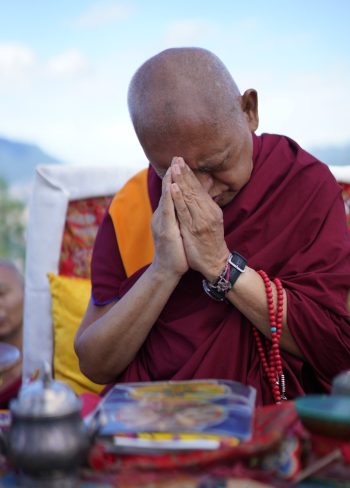
Lama Zopa Rinpoche, Kopan Monastery, 2020. Photo by Ven. Lobsang Sherab.
I don’t think the general population of America accepts clairvoyance, but if it did, people would understand where all the sufferings, such as depression, come from. The way people normally think—for example, what causes depression—is very limited. They only think about things that are to do with this life. If they had clairvoyance they could see much deeper; they could see things such as past and future lives. People normally think of only this life, not past and future lives.
In the past, many of the turkeys that Americans are eating were Americans who in the past had killed turkeys. Often it could even be a past family member that they are now eating.
There’s a sutra story about Buddha’s disciple Shariputra, who excelled in wisdom. Once when he was on his alms round he looked into a family’s house and saw that the father, who used to catch fish in his backyard pond, had died and been reborn as a fish in that pond. The mother, his wife, who had been very attached to the home, had also died and been reborn as the family dog. And the son’s enemy, who had been very attached to the son’s wife, had died and been reborn as their child. The son was holding the child, his former enemy, eating the fish, his late father, and beating the dog, his late mother, while it chewed on fish bones. Shariputra then observed, “The son is eating his father’s flesh, beating his mother with a stick, and cuddling his enemy on his lap—samsaric existence makes me laugh.”
If we have animals we have to remember this story and take care of them well. It is very important to understand the benefits of taking care of our pets and other animals by giving them food and drink. Think that you are making charity and don’t just do it out of attachment, thinking that you love the shape of the animals or something, doing everything simply for your own happiness. It’s the same with looking after your children. You create a child with attachment, for your own happiness, thinking how your life would be unbelievably happy if you had a child. Then you take care of the child, but it is for your own happiness.
It is also important to recognize and remember your animals’ most unbelievable kindness, how they have been kind to you in three ways, and then with that awareness give them food and drink. First recite OṂ MAṆI PADME HŪṂ and then blow over the food and drink to bless it. If you have mani pills, it’s good to crush them and put them into the food and drink, or even add blessed water. You don’t have to get blessed water from a lama; you can make it yourself. Whether or not you have daily commitments, recite OṂ MAṆI PADME HŪṂ and other mantras, such as OṂ PADMO UṢHṆĪṢHA VIMALE HŪṂ PHAṬ, the Mitrugpa mantra and so forth, and then blow on the water. You can recite however many repetitions of each mantra you want, like seven, ten, fifteen, or more, blow on the animal’s food or water and make prayers as well. Similarly, you can keep a bottle of water nearby and when you’ve done your commitments you can blow on the water and then use that to put on the food and water that you give to the animals.
Then make this dedication prayer:
Due to all the past, present, and future merits collected by me and all the merits of the three times collected by numberless buddhas and numberless sentient beings, may all these animals (you can also include your family members, especially your father and mother) never ever get reborn back into the lower realms but be reborn in a pure land where they can achieve enlightenment, or, if not, at least receive a perfect human body, meet the Mahayana teachings, and a perfectly qualified guru revealing the unmistaken path to enlightenment, and by pleasing the holy mind of the virtuous friend may they attain enlightenment as quickly as possible.
Finally, please remember the unbelievable benefits of making charity of food to the animals. As the Buddha said, “Anybody who makes charity well during the period my teachings exist will receive great enjoyments for 80,000 eons, even if the material that person offers is merely the size of a hair. That person will be free from pain and disease, will enjoy great happiness, will be enriched with all manner of desirable things, and will eventually achieve the result: peerless cessation and complete enlightenment.”
This advice has been extracted from the page “Prayers and Practices to Do for Turkeys at Thanksgiving,” which shares a teaching and advice given by Lama Zopa Rinpoche in Switzerland in 2018. Scribed by Holly Ansett. Edited by Nicholas Ribush, November 2020.
For more mantras and resources for mantra recitation, visit FPMT Education Services’ page on mantras. You can find a full catalogue of all FPMT prayers, practices, and advice materials on FPMT.org.
Foundation for the Preservation of Mahayana Tradition (FPMT), is a Tibetan Buddhist organization dedicated to the transmission of the Mahayana Buddhist tradition and values worldwide through teaching, meditation and community service.
- Tagged: thanksgiving
1
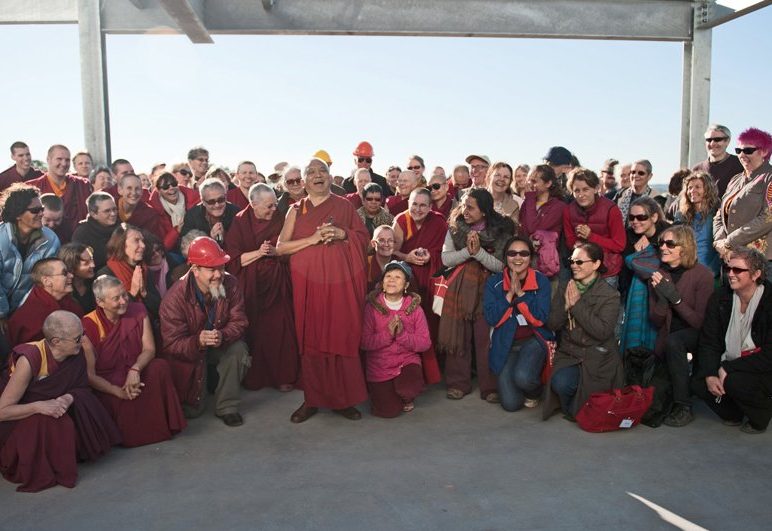
Lama Zopa Rinpoche and students participating in the retreat at the Great Stupa of Universal Compassion, Australia, April 2011. Photo by George Manos.
Recently we reminded students about three teaching events Lama Zopa Rinpoche offered on Bodhicaryavatara (A Guide to the Bodhisattva’s Way of Life) and Rinjung Gyatsa Retreat at the Great Stupa of Universal Compassion in Bendigo, Australia. These events occurred in 2011, 2014, and 2018, and are all available on our Rinpoche Available Now page.
That first retreat, attended by over 200 students, was referred to as a “retreat of a lifetime” by many of the participants. This retreat is also remembered as the time when Rinpoche manifested the symptoms of a stroke.
“This became an intense teaching on so many levels for all of us, whether we were physically present at the retreat or back in our daily lives. The importance of making your life meaningful is resonating in my mind and how we really need to put effort into transforming our minds,” Helen Patrin told Mandala at the time.
Ven. Thubten Kunsang, the French monk who until his death in 2016 recorded Rinpoche’s teachings, created short videos of the 2011 retreat. One of these videos shares many scenes with Rinpoche, including showing the open structure of the Great Stupa, where the teachings were held, before the Stupa’s exterior was complete. Other scenes include Rinpoche blessing insects, talking about the Mani caps, doing preta practice, and discussing the Namgyalma mantra. The video concludes with Rinpoche reminding us how our lives are all a hallucination. Please enjoy this short video, which contains so many joyful snippets of Rinpoche using every moment to benefit and inspire others:
For more information on the 2011 retreat, written after it occurred, read: “The Retreat of a Lifetime: Guru Devotion in Australia with Lama Zopa Rinpoche” and “When the Guru Manifests a Stroke: Ordinary Appearances and Extraordinary Teachings from Lama Zopa Rinpoche” from Mandala July-September 2011.
2011 Bodhicaryavatara (A Guide to the Bodhisattva’s Way of Life) and Rinjung Gyatsa Retreat in Australia is available to watch on our Rinpoche Available Now page, as are the 2014 and 2018 retreats.
Lama Zopa Rinpoche (1945-2023) was the spiritual director of the Foundation for the Preservation of Mahayana Tradition (FPMT), a Tibetan Buddhist organization dedicated to the transmission of the Mahayana Buddhist tradition and values worldwide through teaching, meditation and community service.
- Tagged: a guide to the bodhisattva's way of life, australia retreat 2011, bendigo, great stupa of universal compassion
20
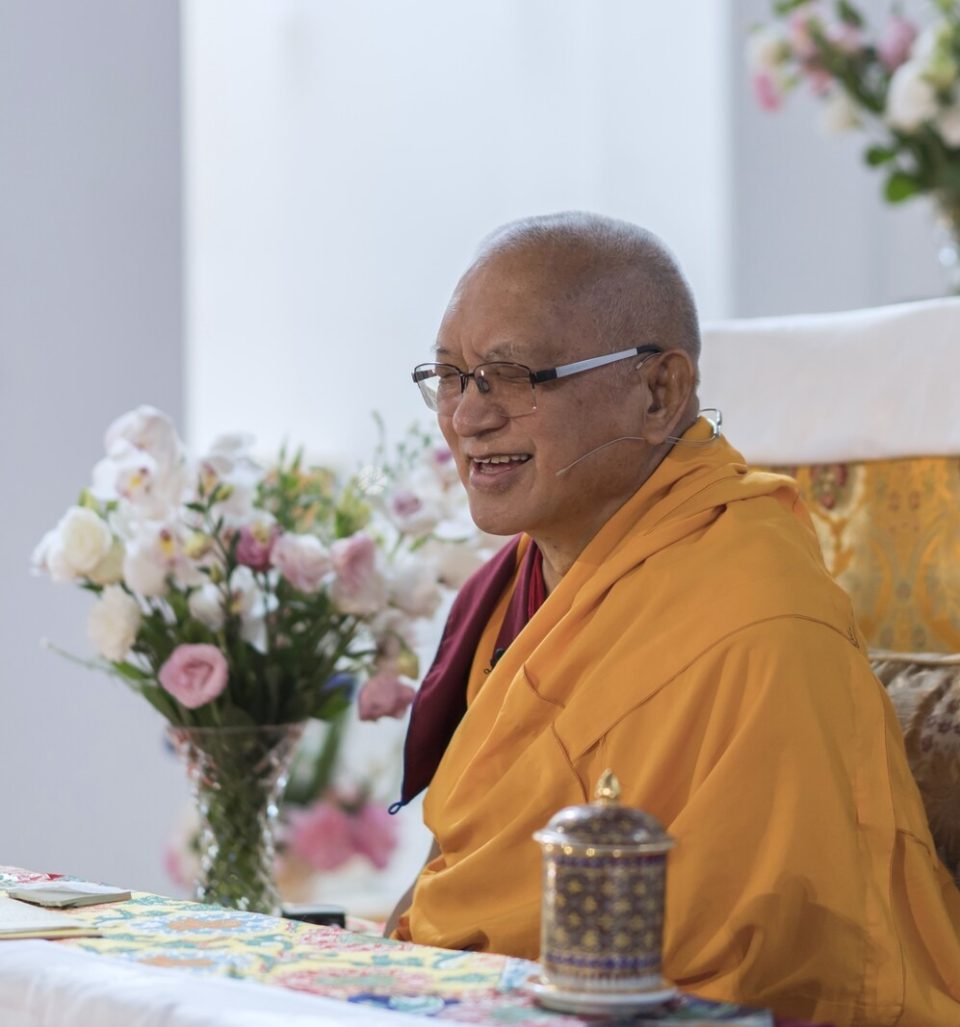
Lama Zopa Rinpoche teaching at the Great Stupa of Universal Compassion, Bendigo, AUS, April 3, 2018. Photo by Ven. Lobsang Sherab.
FPMT.org’s Rinpoche Available Now page is an incredibly rich resource for those wishing to explore full teaching events offered by Lama Zopa Rinpoche over the years.
In 2018 Lama Zopa Rinpoche spent six weeks leading the Bodhicaryavatara (A Guide to the Bodhisattva’s Way of Life) and Rinjung Gyatsa Retreat at the Great Stupa of Universal Compassion in Bendigo, Australia, offering more than sixty teachings. This was the third time Rinpoche offered this retreat series at the Great Stupa of Universal Compassion.
In early April 2011, Lama Zopa Rinpoche began teaching this retreat series, co-hosted by the Great Stupa, Atisha Centre, and Thubten Shedrup Ling Monastery, and attended by nearly 200 students, Rinpoche taught for about ten days before manifesting the symptoms of a stroke.
The first teachings in this series from 2011 are also available on the Rinpoche Available Now page. Rinpoche continued his retreat series at the Great Stupa in September-October 2014 (also available on the Rinpoche Available Now page) and in April-May 2018 (referenced here), and was scheduled to lead the March-April 2020 retreat, which was postponed due to the pandemic.
Video recordings of these teachings from 2018 are available, as well as additional teachings from this time at Chag-tong Chen-Tong Centre and Chenrezig Institute on our Rinpoche Available Now page. In addition to video recordings, unedited transcripts and audio files from these teachings are also made available for each teaching event.
Today we are sharing the video teaching, “Only Solution to Problems is to Practice Dharma and Subdue the Mind,” given on April 2, 2018 at the Great Stupa of Universal Compassion.
In this teaching Rinpoche stresses that we have experienced problems since beginningless rebirths and if we don’t practice Dharma in this life and actualize the path, these problems will just continue. Most of us only practice Dharma after everything else, and Dharma gets left out when we don’t have time. However, practicing Dharma is the most important thing, otherwise problems never finish. Thus, the only solution is to practice Dharma. To take care of oneself means not only taking care of the body, but subduing the mind. In fact, the best way to take care of the body is to take care of the mind. Practicing Dharma is to take care of oneself, but additionally to take care of the numberless sentient beings who are just like yourself, with bodhichitta. This is the most important.
Watch “Only Solution to Problems is to Practice Dharma and Subdue the Mind”:
2011 Bodhicaryavatara (A Guide to the Bodhisattva’s Way of Life) and Rinjung Gyatsa Retreat in Australia can be viewed here:
https://fpmt.org/media/streaming/teachings-of-lama-zopa-rinpoche/lama-zopa-rinpoche-teachings-in-bendigo-australia-2011/
2014 can be viewed here:
https://fpmt.org/media/streaming/teachings-of-lama-zopa-rinpoche/lama-zopa-rinpoche-teachings-in-australia/
2018 can be viewed here:
https://fpmt.org/media/streaming/teachings-of-lama-zopa-rinpoche/lama-zopa-rinpoche-teachings-in-bendigo-2018/
Lama Zopa Rinpoche (1945-2023) was the spiritual director of the Foundation for the Preservation of Mahayana Tradition (FPMT), a Tibetan Buddhist organization dedicated to the transmission of the Mahayana Buddhist tradition and values worldwide through teaching, meditation and community service.
- Home
- News/Media
- Study & Practice
- About FPMT Education Services
- Latest News
- Programs
- New to Buddhism?
- Buddhist Mind Science: Activating Your Potential
- Heart Advice for Death and Dying
- Discovering Buddhism
- Living in the Path
- Exploring Buddhism
- FPMT Basic Program
- FPMT Masters Program
- FPMT In-Depth Meditation Training
- Maitripa College
- Lotsawa Rinchen Zangpo Translator Program
- Universal Education for Compassion & Wisdom
- Online Learning Center
- Prayers & Practice Materials
- Overview of Prayers & Practices
- Full Catalogue of Prayers & Practice Materials
- Explore Popular Topics
- Benefiting Animals
- Chenrezig Resources
- Death & Dying Resources
- Lama Chopa (Guru Puja)
- Lama Zopa Rinpoche: Compendium of Precious Instructions
- Lama Zopa Rinpoche: Life Practice Advice
- Lama Zopa Rinpoche Practice Series
- Lamrim Resources
- Mantras
- Prayer Book Updates
- Purification Practices
- Sutras
- Thought Transformation (Lojong)
- Audio Materials
- Dharma Dates – Tibetan Calendar
- Translation Services
- Publishing Services
- Teachings and Advice
- Find Teachings and Advice
- Lama Zopa Rinpoche Advice Page
- Lama Zopa Rinpoche: Compendium of Precious Instructions
- Lama Zopa Rinpoche Video Teachings
- ༧སྐྱབས་རྗེ་བཟོད་པ་རིན་པོ་ཆེ་མཆོག་ནས་སྩལ་བའི་བཀའ་སློབ་བརྙན་འཕྲིན།
- Podcasts
- Lama Yeshe Wisdom Archive
- Buddhism FAQ
- Dharma for Young People
- Resources on Holy Objects
- Ways to Offer Support
- Centers
- Affiliates Area
- Teachers
- Projects
- Charitable Projects
- Make a Donation
- Applying for Grants
- News about Projects
- Other Projects within FPMT
- Support International Office
- Projects Photo Galleries
- Give Where Most Needed
- FPMT
- Shop
Translate*
*powered by Google TranslateTranslation of pages on fpmt.org is performed by Google Translate, a third party service which FPMT has no control over. The service provides automated computer translations that are only an approximation of the websites' original content. The translations should not be considered exact and only used as a rough guide.It’s the foggy mind, the mind that’s attracted to an object and paints a distorted projection onto it, that makes you suffer. That’s all. It’s really quite simple.







